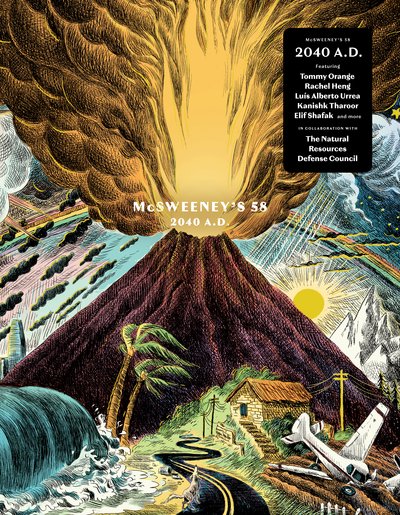This post is the second in a series of short reviews about individual stories from McSweeney’s 58 Climate Fiction issue. The first post, on Mikael Awake’s “The Good Plan” is here.
The focus of this review is “The Rememberers” by Rachel Heng. Heng is the bestselling author of The Great Reclamation (forthcoming in 2022) and Suicide Club (2018). Born and raised in Singapore, and now living in Austin, TX, Heng has fiction in The New Yorker, Best Small Fictions, Kenyon Review and many other venues.
“The Rememberers” is set in a future Singapore in which society has been upended by sea level rise. Encroaching water is kept at bay by the sea wall, but many are left unprotected in the decommissioned zones. The “lucky” ones are buried in stories-deep underground apartments which make room for the privileged on the surface but deprive most of fresh air and sunlight.
In this beleaguered society, the Ministry recruits members of the older generation to recount their childhood stories, including details about the location and description of buildings, schools, relationships, and day to day life. With this information, fed into a developing algorithm, the Ministry hopes to find the link between the old way of life and the new. But for Ma, the narrator’s elderly mother, remembering — a process which brings memories to life for the rememberer — becomes a reason to live in a world she barely recognizes and which promises only exponential upheaval.

Like Mikael Awake’s “The Good Plan” (reviewed here), Heng’s story makes memory a crucial element in successfully bridging the chasm between a pre and post climate change world. For Ma, the memories she relates of her childhood, of the people she cares about, and the places she loved, give the present day meaning. When she is removed from that — through memory loss due to Alzheimer’s, through the displacement of her home to an underground bunker, and the subsequent loss of community — she becomes destructive.
The ending of this story was a surprise; despite the increasing disorientation and destructiveness exhibited by Ma as she rails against her personal memory loss and her removal from the Ministry program, I was not expecting that violence to be taken up by the narrator. Upon further reflection, however, it is difficult to see another path forward for this family which has been literally buried alive. The Ministry has taken Ma’s memories and now denies her the comfort of those long-ago experiences. In this way, memory is a resource which the state harvests and uses with the same indifference as it did water, wood, metals, and fresh air. The narrator’s violence at the end of the story is drawing a boundary, demanding an end to the careless use of resources, which includes the people who are otherwise discarded.
I wonder how intentionally Heng positions Alzheimer’s disease as a metaphor for how we experience the climate changed world. Ma no longer recognizes her changed surroundings as home, despite the fact that she is surrounded by her furniture and other belongings. For her, the experience of the new world is one of uncanny displacement and as she becomes increasingly agitated she destroys those belongings which link her to her former life. The narrator’s violence at the end of the story, then, could be read in two ways. First, that she is resisting the commodification of memory by the state and insisting on humane treatment; or, perhaps the narrator becomes an agent for her mother and her memories, destroying that which comforts and placates, thereby demanding real solutions to environmental catastrophe. There may be other ways to read the ending to this poignant story and the nuanced precedent suggests that more than one of these or other readings could be a part of Heng’s vision.
Heng’s “The Rememberers” is gripping and troubling and as part of the wider collection from McSweeney’s, argues for an increasing acknowledgement of culture (through memory, stories, and interpersonal connection) in the systems disrupted by climate change.
